Government Hostility To Music In Iran 'Worse Than in Afghanistan'

Prominent Iranian musician Hossein Alizadeh says pressure on music and musicians in Iran is incomparably higher than any other Islamic country in the world.

Prominent Iranian musician Hossein Alizadeh says pressure on music and musicians in Iran is incomparably higher than any other Islamic country in the world.
Alizadeh made the comments after watching a concert in Tehran’s Vahdat hall, which opened its doors to people after a 22-month hiatus due to Covid-19 restrictions.
Alizadeh highlighted that even the Taliban is gradually opening Afghanistan’s music conservatories.
He appreciated solidarity among the Iranian artists, saying, “If music is being insulted, we are all being insulted.
His criticism was apparently a reaction to recent remarks by Iranian lawmakerKazem Mousavi, who said Western musical instruments should not be allowed in an Islamic country, noting that that anyone who desired a different lifestyle should leave Iran.
According to the head of Customs Administration Iran has classified musical instruments – along with sunglasses and over a thousand other commodities -- as luxury items and banned their import.
In a meeting with Culture Minister Mohammad-Mehdi Esmaeili on Thursday, firebrand cleric Ahmad Alamolhoda criticized artists in Iranfor feeling entitled.
“They should be asked what they have done for the Islamic revolution” said the staunch supporter of Supreme Leader Ali Khamenei, who is the father-in-law of Iran's President Ebrahim Raisi.
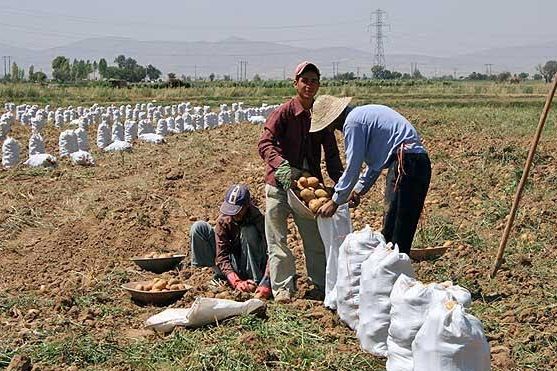
Turkmenistan and Uzbekistan have rejected large shipments of Iranian potatoes, citing dangerous contamination with agricultural pesticides and chemicals..
Heydar Sakenborji, the head of the Fruit and Vegetables Association of the city of Mashhad, in Khorasan Razavi province, told Tejarat news that the low quality of the pesticides used is the main culprit.
He elaborated that after harvest, most agricultural produce should be quarantined for a specific period for pesticides to naturally become less harmful, but pesticides used in Iran stay longer on fruits and vegetables making them toxic for humans.
"According to the investigations, pesticides used in these agricultural products are imported from China," Sakenborji said, speculating that these pesticides don’t have the required standards and quality.
He also said that in about ten days Pakistan took over these Central Asian markets from Iranian fruits and vegetables.
The Uzbek government has reportedly returned around 3,500 tons of the potatoes to Iran and destroyed other 775 tons.
Recently, a trade representative in Tehran said various countries have banned imports of Iranian fruits and vegetables due to mold or high pesticide residues, adding that India, Russia, Uzbekistan, the United Arab Emirates, Oman, Qatar and some others no longer accept certificates issued by Iran.
Iran exported $6.5 billion in agricultural products last year.
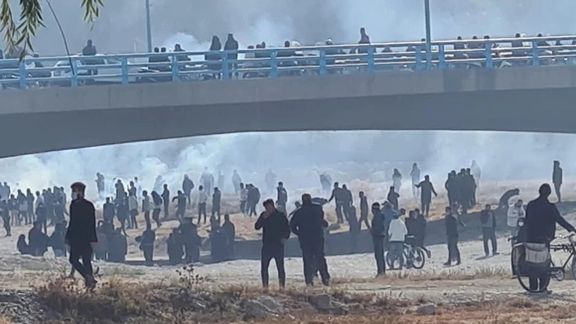
A conservative newspaper in Tehran warned on Sunday that if the government’s proposed new budget is adopted it might lead to a “major social explosion.”
"If the government's budget bill for the next Iranian year, [starting late March] is implemented, it will create a lot of problems for the people and might lead to a major social explosion that cannot be controlled," Jomhuri Eslami (Islamic Republic) daily wrote in an editorial. The paper called on parliament to amend the bill.
In November 2019, a government decision to increase fuel prices led to immediate street unrest, put down by security forces who killed hundreds of people. As a result, the regime’s legitimacy took a big blow.
The daily said that the government should not increase taxes and should continue to subsidize essential commodities by allocating cheap foreign currency for their import to prevent further inflation.
The leading conservative paper charged that those who wrote the budget bill failed to understand the importance of these points because they do not come from the low-income classes and do not know about the impact of a devalued national currency on people's livelihood.
Jomhouiri Eslami further added that the new taxation regulations stipulated in the budget bill will lead to a revolt.The daily suggested that the government should avoid allocating budget to municipalities and to tens of useless organizations.
Iranian economists and media have often criticized the governments for allocating hefty budgets to the seminaries and propaganda organizations whose only function is to convince the people that the government's ideology can lead to their salvation.
Meanwhile, reformist newspaper Sharq in a report on Saturday reminded that President Ebrahim Raisi in his latest televised interview on December 5 said, "We are not going to surprise the people by sudden hikes in prices." The paper wrote despite the president’s statement price continued to increase since he took office in August.
Sharq said that given the government's inability to control prices, it is likely that the people will surprise Raisi. This was a clear allusion to the possibility of protests in Iran because of rising inflation as many Iranian analysts have warned.
Iran’s inflation began to rise dangerously after the United States pulled out of the 2015 nuclear deal and imposed sanctions in 2018. Without oil export revenues, the government is facing a serious budget shortfall. The currency rial has fallen eightfold since early 2018.
Last week, once again Raisi called on his economic team to make sure that the prices do not go up as people prepared to celebrate a pre-Islamic feast on the longest night of the year, Yalda, on December 21. But press and social media reports indicated that food shopping was reduced to a quarter of what it was last year.
Sharq reminded Raisi that ordering his managers to lower the prices is not likely to work. "He still cannot believe that he is the president and in charge of managing the economy. That is why he keeps issuing orders to others instead of taking action to correct the situation," the paper quoted social media users as saying.
Sharq also pointed out that only three days after Raisi promised on live TV that he would not surprise the people, the price of Iranian-made cars went up by 100 to 500 million rials each. This further discredited Raisi because the cars are being produced by or in partnership with the government. Sharq quoted social media users as saying that "The economic Mafia made the president look like a fool.”
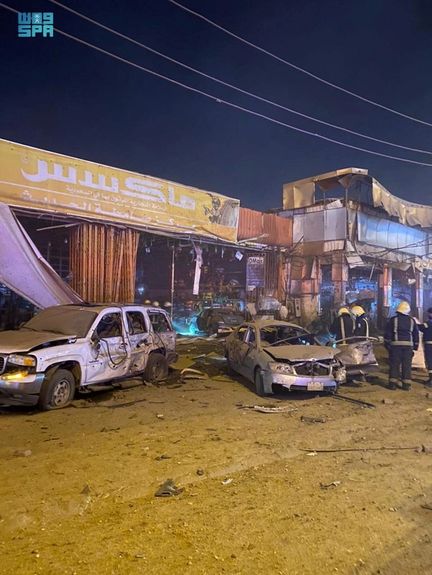
A Saudi citizen and a Yemeni resident were killed by a Houthi projectile that hit the southern Saudi city of Jazan on Friday, Saudi state media has reported.
The projectile also left six Saudis and one Bengali resident injured and it damaged 12 cars and two shops, the Saudi state news agency said.
The Saudi-led coalition fighting the Iran-aligned Houthis in Yemen carried out an attack later on Friday in response to what it called "the attack's origins" and said it will follow that with a wider attack on Houthi military targets.
Houthi military spokesman Yahya Sarea wrote on Twitter on Saturday that three ballistic missiles targeted "critical" sites in Jazan.
The main Houthi news outlet Al Masirah TV said a child and a woman were killed and seven more were injured in coalition strikes on Yemen's Al Mahwit governorate.
Another Houthi Projectile hit Saudi's Najran city causing material damage.
Coalition forces struck a Houthi military camp in the center of the Yemeni Capital Sanaa early on Friday, with residents telling Reuters explosions rocked the city.
The coalition intervened in Yemen in 2015 after the Houthis ousted the internationally recognised government from Sanaa.
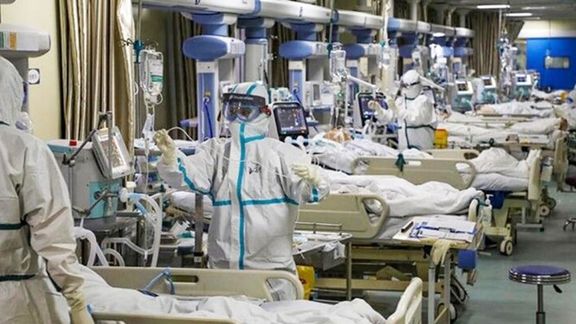
Iran says it has closed all land and sea borders in the southwestern Khuzestan province to reduce the expected spread of the new Covid-19 variant, Omicron.
Deputy Governor-General of Khuzestan, Valiollah Hayati, who oversees the provincial Covid taskforce, announced the restrictions on Saturday, saying the 15-day mandate starts immediately.
He then exempted holders of valid residence permits, student and work visas, students of seminaries and universities, as well investors and medical visas, adding that “only people from these seven groups” are allowed to cross the borders with their vaccine cards and a negative PCR test. Iraq borders Iran in the southwest.
Iran confirmed the first Omicron case on Sunday, December 19, and began preparations to deal with the new virus.
An official earlier in the week in Tehran said hospitals and clinics are on alert and are expanding emergency room services in anticipation of more infections with Omicron, noting that its impact will be felt next week.
Iran has reportedly vaccinated about 60 percent of its 84-million population with two doses of Covid vaccines, mainly the Chinese-made Sinopharm and the Russian Sputnik-V.
Although fatal cases have been decreasing during the past few weeks due to vaccination, a new study has indicated that Sinopharm and Sputnik vaccines are weaker against Omicron.
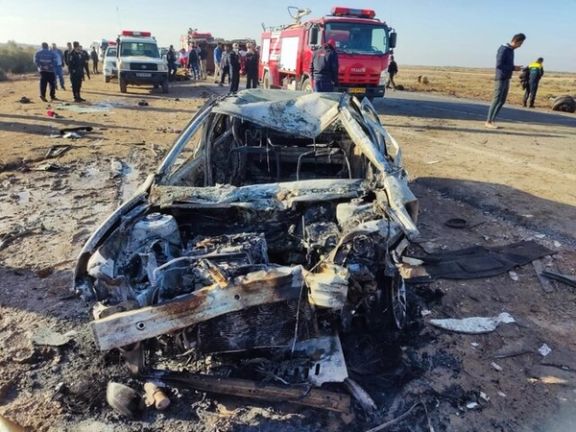
Ten people have died and more than a dozen injured Saturday in a multiple vehicle collision in Iran, which has one of the highets road fatalities in the world.
The deadly accident happened on Ahvaz-Khorramshahr highway in the southwest, when a truck crashed into a minibus and knocked it off its course, making it impossible for three cars to avoid hitting it.
According to the traffic police chief in Khizestan province, Reza Dolatshahi, the nine passengers of the bus, which was carrying workers of a local oil firm, and the driver of the truck, which was loaded with livestock, were the fatalities of the accident while two of the injured are in critical condition.
He added that about 440 people had lost their lives in road accidents in the province in first eight months of this year.
According to official figures, traffic accidents have claimed the lives of 8,644 Iranians from March to September, an increase of about 10 percent compared to the same period last year.
An earlier report by Iran’s traffic police said that nearly 280,000 have been killed and more than four million injured in car accidents in over a decade in the country. Iran ranks 8th highest country in road fatalities.
Substandrad vehicles and poor road condition are tha main reason for the high numbers.